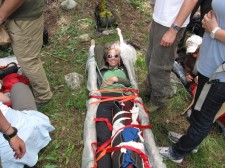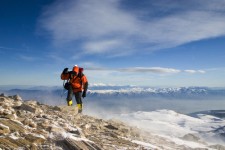The best way to avoid a survival situation is to be prepared, knowledgeable, and humble enough to know when to quit.
Knowledge of human physiology is also helpful to survival situation. Adventurers should be taught how to manage their body’s emotional and physiological responses to stress in addition to learning the technical skills of wilderness survival. Otherwise, the stress reaction can disrupt the retrieval of critical information.
In Deep survival: Who lives, who dies, and why, Lauren Gonzales describes wilderness emergency situations and describes how people have managed those situations. He examines how accidents happen and why some people survival when others, often wilderness experts, perish.

Stress Response
Instinctively, our bodies physiologically react to an emergency situation. Without our conscious control, “the nervous system fires more energetically, the blood changes its chemistry so that it can coagulate more rapidly, muscle tone alters, digestion stops, and various chemicals flood the body,” describes Gonzales (2004, p. 31). The purpose is self-preservation and preparation for action.
When the fear reaction begins, catecholamines, epinephrine and norepinephrine, are released from the adrenal glands. Norepinephrine is responsible for the initial jolt, but they both have several physiological effects. These hormones influence the firing of nerve cells and the contraction of smooth muscle fibers and they constrict blood vessels. This activates neural networks and more chemical compounds are released, such as cortisol from adrenal cortex. Heart rate increases, respiratory rate increases, and sugar floods the metabolic system.

The survival situation depends not only on a person’s physiological condition and physical resources, but also the person’s emotional response to the flight-or-flight response.
Who Survives?
Gonzales stated that just 10 to 20 percent of people can stay calm and think clearly when in a survival emergency (2004, p. 24).
Emotion is a key part of physiological regulation. Anxiety impairs working memory. It is thought to create attention bias and disrupt visuospatial capacity. Hormones released “dampen explicit (conscious) memory even while creating and recalling implicit (unconscious) memories with greater efficiency” (Gonzales, 2004, p. 37).
Therefore, Gonzales concludes:
“A survivor must compartmentalize and set small goals. It would kill him not to” (2004, p. 242).

Unfamiliar Environment
That the environment is so dissimilar affects cognition as well. Survival relies on the brain’s ability to effectively transfer knowledge to a dissimilar context (far transfer). There is evidence that it can be improved by metacognitive skills, such as orienting and self-judging, which is exactly what Gonzales suggests to the wilderness adventurer.
So, if you are headed out on a wilderness adventure, get proper training. If there is a medical emergency, take some deep breaths and allow the initial stress response to pass. Stay calm and work at your skill level and according to emergency plans.
For wilderness medical training, go to Wilderness Medicine Institute at the National Outdoor Leadership School (NOLS). They offer courses for all levels, all over the world.
To learn more about how to maintain control in stressful situations, contact Summit Performance Consulting LLC at 561-325-8363 or at Info@SummitPerformanceConsulting.com.
